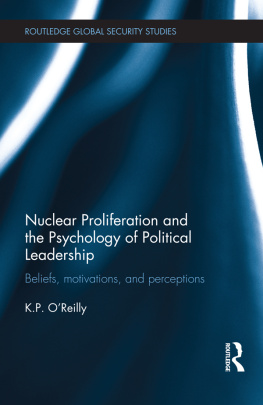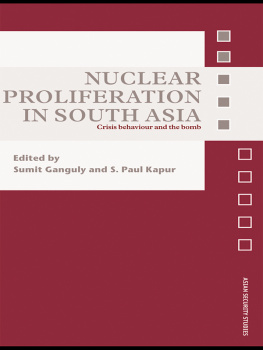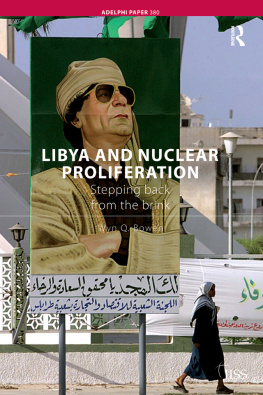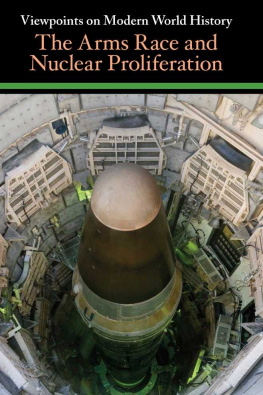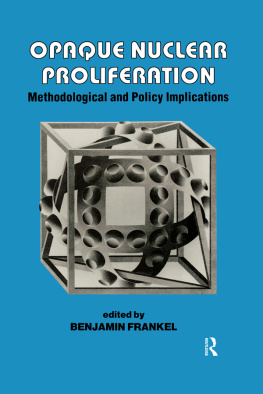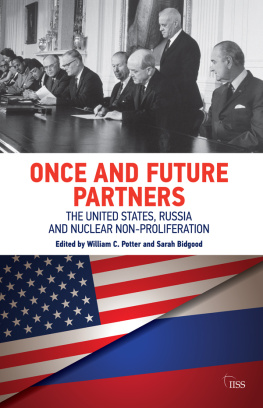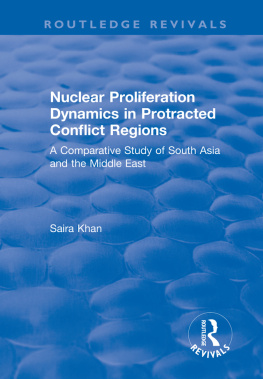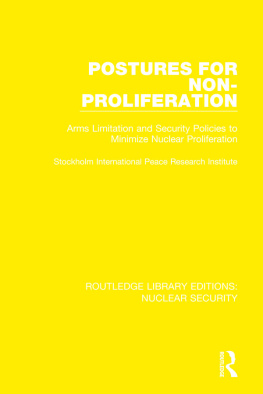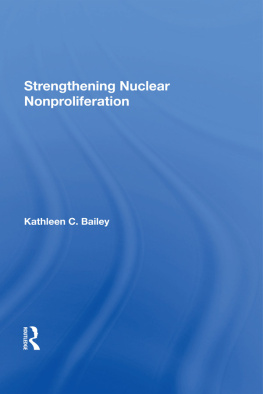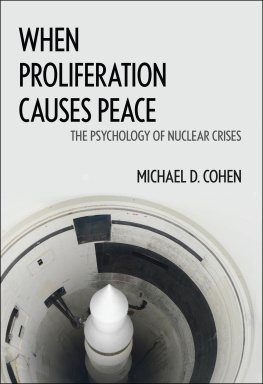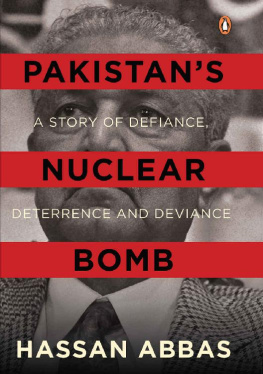Nuclear Proliferation and the Psychology of Political Leadership
This book offers a novel approach to understanding the puzzle of nuclear proliferation by examining how leaders beliefs and perceptions about the international system influence states decisions to acquire nuclear weapons.
Today, there is a persisting dilemma over the spread of nuclear weapons for both practitioners and scholars of international affairs. Uncertainty remains whether determined proliferators can be stopped, as shown by the cases of North Korea and Iran. These instances of proliferation raise questions about regional stability, the use of pre-emptive military action, and the potential for reactive-proliferation by neighboring countries. Despite the serious implications surrounding the spread of these weapons, proliferation scholarship has thus far failed to solve what has been described as the proliferation puzzlewhy do some countries choose nuclear weapons while others do not?
The author argues that understanding basic psychological motivations, such as the role of power and perceptions of Self and Other, forms a strategic context which provides answers about a leaders willingness to proliferate. Proliferation willingness is a critical, yet frequently overlooked, part of the proliferation equation. Ultimately, it is the combination of willingness and proliferation opportunity (i.e., technical and scientific capabilities) that determines whether a country goes nuclear. By examining several historical instances of proliferation decision-makingin South Africa, India, Australia, and Libyathe books findings highlight the fundamental role of leaders beliefs in shaping proliferation outcomes.
This book will be of much interest to students of nuclear proliferation, political psychology, security studies, and IR in general.
K.P. OReilly is Assistant Professor of Political Science and Global Studies at Carroll University, USA.
Routledge Global Security Studies
Series Editors: Aaron Karp and Regina Karp
Nuclear Proliferation and International Security
Edited by Morten Bremer Maerli and Sverre Lodgaard
Global Insurgency and the Future of Armed Conflict
Debating fourth-generation warfare
Terry Terriff, Aaron Karp and Regina Karp
Terrorism and Weapons of Mass Destruction
Responding to the challenge
Edited by Ian Bellany
Globalization and WMD Proliferation
Terrorism, transnational networks, and international security
Edited by James A. Russell and Jim J. Wirtz
Power Shifts, Strategy, and War
Declining states and international conflict
Dong Sun Lee
Energy Security and Global Politics
The militarization of resource management
Edited by Daniel Moran and James A. Russell
US Nuclear Weapons Policy after the Cold War
Russians, rogues and domestic division
Nick Ritchie
Security and Post-Conflict Reconstruction
Dealing with fighters in the aftermath of war
Edited Robert Muggah
Network Centric Warfare and Coalition Operations
The new military operating system
Paul T. Mitchell
American Foreign Policy and the Politics of Fear
Threat inflation since 9/11
Edited by A. Trevor Thrall and Jane K. Cramer
Risk, Global Governance and Security
The other war on terror
Yee-Kuang Heng and Kenneth McDonagh
Nuclear Weapons and Cooperative Security in the 21st Century
The new disorder
Stephen J. Cimbala
Political Economy and Grand Strategy
A neoclassical realist view
Mark R. Brawley
Iran and Nuclear Weapons
Protracted conflict and proliferation
Saira Khan
US Strategy in Africa
AFRICOM, terrorism and security challenges
Edited by David J. Francis
Great Powers and Strategic Stability in the 21st Century
Competing visions of world order
Edited by Graeme P. Herd
The Globalisation of NATO
Intervention, security and identity
Veronica M. Kitchen
International Conflict in the Asia-Pacific
Patterns, consequences and management
Jacob Bercovitch and Mikio Oishi
Nuclear Proliferation and International Order
Challenges to the Non-Proliferation Treaty
Edited by Olav Njlstad
Nuclear Disarmament and Non-Proliferation
Towards a nuclear-weapon-free world?
Sverre Lodgaard
Nuclear Energy and Global Governance
Ensuring safety, security and non-proliferation
Trevor Findlay
Unipolarity and World Politics
A theory and its implications
Birthe Hansen
Disarmament Diplomacy and Human Security
Regimes, norms and moral progress in international relations
Denise Garcia
Causes and Consequences of Nuclear Proliferation
Edited by Robert Rauchhaus, Matthew Kroenig and Erik Gartzke
Why Did the United States Invade Iraq?
Edited by Jane K. Cramer and A. Trevor Thrall
Regional Powers and Security Orders
A theoretical framework
Edited by Robert Stewart-Ingersoll and Derrick Frazier
A Perpetual Menace
Nuclear weapons and international order
William Walker
Irans Nuclear Programme
Strategic implications
Joachim Krause
Arms Control and Missile Proliferation in the Middle East
Edited by Bernd Kubbig
The National Politics of Nuclear Power
Economics, security and governance
Benjamin Sovacool and Scott Valentine
Arms Controls in the 21st Century
Between coercion and cooperation
Edited by Oliver Meier and Christopher Daase
Reconceptualising Deterrence
Nudging toward rationality in Middle Eastern rivalries
Elli Lieberman
Psychology, Strategy and Conflict
Perceptions of insecurity in international relations
Edited by James W. Davis
Nuclear Terrorism and Global Security
The challenge of phasing out highly enriched uranium
Edited by Alan J. Kuperman
Ballistic Missile Defence and US National Security Policy
Normalisation and acceptance after the Cold War
Andrew Futter
Economic Statecraft and Foreign Policy
Sanctions, incentives and target state calculations
Jean-Marc F. Blanchard and Norrin M. Ripsman
Technology Transfers and Non-Proliferation
Between control and cooperation
Edited by Oliver Meier
Northern Security and Global Politics
NordicBaltic strategic influence in a post-unipolar world
Edited by Ann-Sofie Dahl and Pauli Jrvenp
Geopolitics and Security in the Arctic
Regional developments in a global world
Edited by Rolf Tamnes and Kristine Offerdal
Precision Strike Warfare and International Intervention
Strategic, ethico-legal, and decisional implications
Edited by Mike Aaronson, Wali Aslam, Tom Dyson and Regina Rauxloh
Nuclear Proliferation and the Psychology of Political Leadership
Beliefs, motivations, and perceptions
K.P. OReilly

